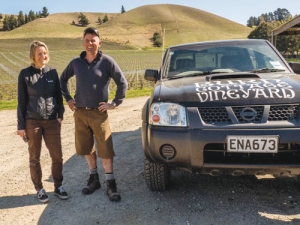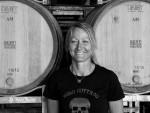From the moment you enter the gravel driveway into Burn Cottage vineyard, it's as if a Zen-like vibe envelops you.
Such calmness and sense of being is something that extends to the team here; if viticulturist Shane Livingstone and general manager-associate wine maker Claire Mulholland are anything to go by.
Situated in the foothills of the Pisa Range, the 24-hectares was purchased in 2002 by the Sauvage family who also own the Koehler Ruprecht Estate in the Pfalz region of Germany. Picked up at auction, after a visit that included tasting some of Central's finest Pinots, the grand vision for Burn Cottage is anything but accidental.
From owner Marquis Sauvage, to head winemaker Ted Lemon who was the first American ever hired to manage an estate in Burgundy, Burn Cottage is founded on a mix of eclectic energy, serious wine lineage and great dirt. In fact it's that dirt that Mulholland and Livingstone say exemplifies what Burn Cottage is all about.
"Marquis said when he first stood here, that this has just got what it takes. He'd seen enough great vineyards around the world to realize that this was something special," says Mulholland.
Starting at Burn Cottage in 2010, after experience gained working at Martinborough Vineyards and Amisfield, Mulholland had been keeping tabs on the site for some time.
"I was really drawn to this place when I first heard about it in the early 2000's; they were really putting themselves out there. I just thought, great site, great people and really committed to making a really healthy vineyard for the future. From the bare land the first thing they started doing was making compost and using different preps on the land and it has developed from there."
It was Ted Lemon who first sowed the seed for biodynamic farming at Burn Cottage, something Livingston as vineyard manager is keen to carry on.
"My first introduction to biodynamics was with James Milton 16-years-ago and I have been involved ever since. Utilising biodynamics and similar methods is just what we do, it's the way we farm. There is no recipe, each property has its own individuality and things that you do at one site won't necessarily work at another. It's about finding the property's personality and working with the natural rhythms."
Some viticulturists will likely look at biodynamics as a fashionable form of witchcraft, akin to farming with one hand while the other stirs cosmic preparations. But for Livingstone, he looks at it a little differently.
"Actually I have found with organics-biodynamics that there are actually more tools in the toolbox. The whole resilience of the system and the way the plants adapt to the environment and conditions is far greater and sturdier than a conventional vineyard in my books.
"Because the property had already had 10 plus years of biodynamic preparations applied when I arrived, you could feel the life and energy in the soil as soon as you walked on it".
The themes of time, patience and not needing to hurry are refrains that Mulholland and Livingstone mention numerous times during the conversation.
"We haven't dragged the vines into production, we've given them a chance to get connected to the earth so we haven't pushed production and I guess that's a luxury that we have had," says Livingstone.
The same planning and future vision also means that when the vineyard was planted it was on grafted rootstock thereby meaning phylloxera doesn't even get a mention around these parts.
"We aren't looking to rip things out, it's all about taking time and getting it right at the start. We are after vine age and longevity. We constantly tell the pruners that our grandkids will have to prune these same vines."
"The type of fruit balance that we are getting and the way things are maturing, has really blown me away," says Mulholland
"The nutrition that we are getting in the juice here is very good, which is great as we really don't want to be adding anything to our ferments. No acid, no yeast, just a little bit of sulphur. I definitely get lots of feedback about the wines having a real earthy quality. I think the complexity in the aromatics is also something they pick up on as well. I mean we pick when everything is very lively and some of the alcohols are quite low because of that, but this site really captures that vibrancy too. We don't get the late afternoon or the late evening sun, it's a different development spectrum to some other vineyards."
Some of the descriptions used to describe farming at Burn Cottage might raise the heckles of any pseudo-science skeptic, but maybe based on the strength of the wines thus far, there might just a little bit of magic taking place.
"Growing utilizing biodynamic techniques, I can see the difference it's making to that final wine so that gives me a lot of satisfaction," says Livingstone. "For me, tasting the final glass of wine and trying to make that better is the only thing that matters."
This email address is being protected from spambots. You need JavaScript enabled to view it.













